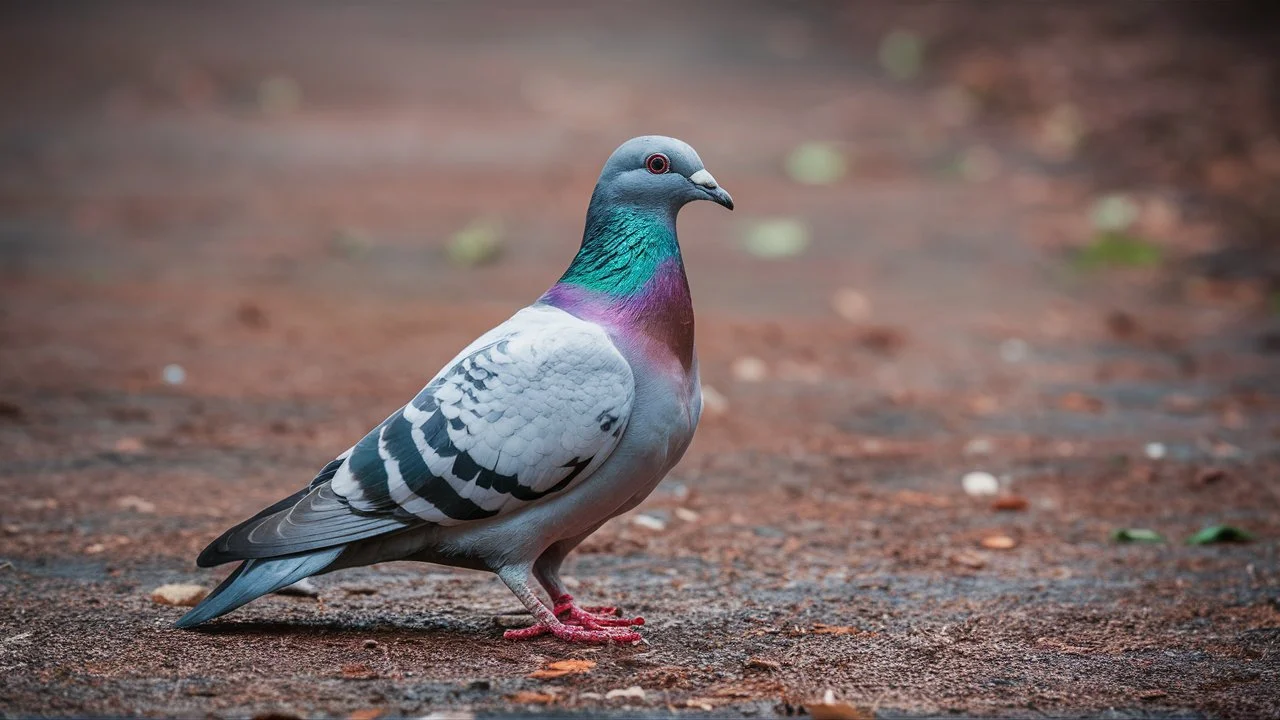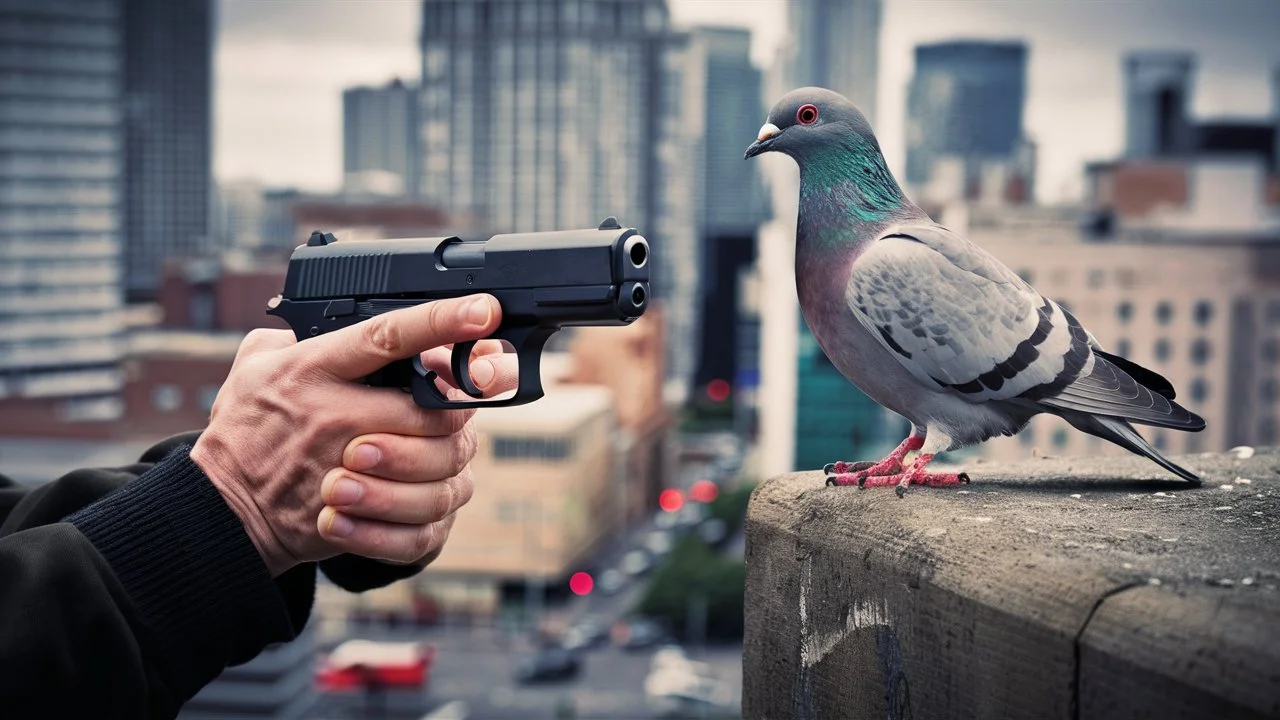Pigeons are everywhere. You can see them in parks, on buildings, and even on your own property. Sometimes, pigeons can be annoying or cause problems, making people wonder if they can legally shoot pigeons to get rid of them. The answer isn’t simple because it depends on where you live and the laws in that area. This article will help you understand whether you can legally shoot pigeons, why people might want to, and other ways to handle pigeon problems.
Shooting pigeons is generally allowed under federal law in the United States since pigeons are not protected. However, state and local laws vary. Some states permit shooting pigeons, while others have specific regulations. Additionally, many cities and towns prohibit discharging firearms within city limits, making it illegal to shoot pigeons in those areas. Always check your local and state laws before taking any action.
Can You Shoot Pigeons Legally?
Pigeons are common birds found throughout the United States. While they can be charming to some, others may see them as pests. This leads to a common question: Can you shoot pigeons legally? The answer depends on various factors, including federal, state, and local laws. This article will explore these laws, reasons people might want to shoot pigeons and alternative solutions.
Related reading:Are Hawks Dangerous to Humans?

Federal Laws
At the federal level, the primary law concerning birds is the Migratory Bird Treaty Act (MBTA). The MBTA protects many bird species, but feral pigeons, also known as rock doves, are not included. This means that there is no federal protection for pigeons, and the legality of shooting them falls to state and local jurisdictions.
State Laws
State laws regarding the shooting of pigeons can vary significantly. Some states may allow the shooting of pigeons, while others may have stricter regulations. Here are a few examples:
- California: In California, pigeons are not protected by state law, but you must have a hunting license to shoot them. Additionally, local ordinances may further restrict shooting in certain areas.
- New York: New York State law generally prohibits the discharge of firearms within city limits, making it illegal to shoot pigeons in most urban areas.
- Texas: In Texas, pigeons are considered non-game animals, and there are fewer restrictions on shooting them, but you must still follow local ordinances.
It’s crucial to check your specific state’s wildlife regulations and hunting laws to determine the legality of shooting pigeons.
Local Laws
Local laws can be even more restrictive than state laws. Many cities and municipalities have ordinances that prohibit the discharge of firearms within city limits. For example, shooting pigeons in a densely populated area is usually illegal due to safety concerns. Always check with local authorities or review local ordinances to ensure compliance with the law.
Reasons for Shooting Pigeons
People might consider shooting pigeons for several reasons:
Pest Control
Pigeons can be considered pests due to their droppings, which can damage buildings and create health hazards. They can also be noisy and disruptive.
Property Protection
Pigeon droppings are acidic and can cause significant damage to buildings, monuments, and vehicles. Property owners might want to shoot pigeons to prevent this damage.
Health Concerns
Pigeons can carry diseases such as histoplasmosis, cryptococcosis, and psittacosis, which can be transmitted to humans. This concern can lead to the desire to reduce pigeon populations.
Ethical and Practical Considerations
Even if shooting pigeons is legal in your area, there are ethical and practical considerations to keep in mind.
Safety
Using firearms in urban or residential areas poses significant safety risks. Stray bullets can cause injury or damage to unintended targets. It is essential to consider the safety of people and pets in the vicinity.
Effectiveness
Shooting pigeons may not be an effective long-term solution. Pigeon populations can quickly rebound, and new pigeons may take the place of those that are shot. It may only provide a temporary fix to the problem.
Ethical Concerns
Many people believe that shooting pigeons is inhumane. There are often more humane ways to deal with pigeon problems. Considering the ethical implications is important before deciding to shoot pigeons.
Alternatives to Shooting Pigeons
There are several alternatives to shooting pigeons that can be more effective and humane.
Physical Barriers
Installing physical barriers can prevent pigeons from roosting and nesting on your property. This can include netting, spikes, and wire systems that make it difficult for pigeons to land.
Habitat Modification
Changing the environment can make it less attractive to pigeons. This can involve removing food sources, such as accessible garbage or bird feeders, and eliminating water sources where pigeons might drink.
Scare Tactics
Using scare tactics can also help keep pigeons away. This can include using decoy predators like owls or hawks, reflective surfaces, or noise devices. These methods can be effective in the short term but might need to be varied to prevent pigeons from becoming accustomed to them.
Professional Pest Control
Hiring a professional pest control service can be a good option. Professionals can provide more permanent solutions and ensure that methods used are safe and effective.
Trapping and Relocation
In some cases, trapping and relocating pigeons can be an option. This method involves capturing pigeons in live traps and then releasing them in a suitable location far from your property. This requires knowledge of local wildlife regulations and may need to be done by a professional.
Birth Control
There are bird birth control products available that can help control pigeon populations humanely. These products are typically mixed with food and prevent pigeons from laying viable eggs.
Other Methods for Culling Pigeons
Pigeons can be a nuisance in both urban and rural settings. They can cause damage to buildings, spread diseases, and create unsanitary conditions. While shooting pigeons is one method of controlling their population, there are several other methods that can be more effective, humane, and practical. This article explores various methods for culling pigeons without resorting to firearms.
1. Trapping and Relocation
Description
Trapping involves capturing pigeons using specially designed traps. Once captured, the pigeons can be relocated to a different area far from the original location.
Pros
- Humane: Pigeons are not harmed during the process.
- Controlled: Allows for the specific targeting of problem areas.
Cons
- Labor-Intensive: Requires regular monitoring and maintenance of traps.
- Limited Effectiveness: Pigeons may return if not relocated far enough.
Best Practices
- Use bait such as grains or seeds to attract pigeons into the traps.
- Check traps frequently to ensure the well-being of the captured pigeons.
- Relocate pigeons to a suitable habitat away from urban areas.
2. Birth Control
Description
Birth control for pigeons involves the use of contraceptive products mixed with food to prevent pigeons from reproducing.
Pros
- Long-Term Solution: Reduces the population over time.
- Non-Lethal: Pigeons are not harmed.
Cons
- Cost: Can be expensive to implement and maintain.
- Slow Results: Takes time to see a significant reduction in population.
Best Practices
- Follow product instructions carefully to ensure effectiveness.
- Use consistently over a period to achieve the desired population control.
3. Physical Barriers
Description
Physical barriers prevent pigeons from roosting and nesting in unwanted areas. These can include bird spikes, nets, and wire systems.
Pros
- Effective: Prevents pigeons from landing in specific areas.
- Durable: Long-lasting solution when properly installed.
Cons
- Initial Cost: Installation can be expensive.
- Maintenance: Requires occasional maintenance to ensure effectiveness.
Best Practices
- Install bird spikes on ledges, rooftops, and other roosting sites.
- Use nets to cover large areas such as courtyards and open spaces.
- Regularly inspect and maintain barriers to ensure they remain effective.
4. Habitat Modification
Description
Habitat modification involves changing the environment to make it less attractive to pigeons. This can include removing food and water sources and altering roosting sites.
Pros
- Cost-Effective: Often involves simple changes.
- Long-Term: Reduces the attractiveness of the area to pigeons permanently.
Cons
- Limited Scope: May not be feasible in all areas.
- Requires Cooperation: Often needs coordination with community members or building owners.
Best Practices
- Ensure garbage bins are securely closed and food waste is promptly disposed of.
- Eliminate standing water sources where pigeons might drink.
- Modify ledges and flat surfaces to prevent pigeons from roosting.
5. Scare Tactics
Description
Scare tactics use visual, auditory, or physical deterrents to frighten pigeons away from certain areas. Common methods include decoy predators, reflective surfaces, and noise devices.
Pros
- Immediate Effect: Can quickly deter pigeons from an area.
- Non-Lethal: Pigeons are not harmed.
Cons
- Temporary: Pigeons may become accustomed to deterrents over time.
- Maintenance: Requires regular changes to remain effective.
Best Practices
- Use a combination of visual and auditory deterrents for maximum effectiveness.
- Rotate and change scare tactics regularly to prevent pigeons from adapting.
- Place deterrents in areas where pigeons are most active.
6. Chemical Repellents
Description
Chemical repellents can be applied to surfaces to make them unpleasant for pigeons to land on. These repellents often come in gel or liquid form.
Pros
- Effective: Can deter pigeons from specific areas.
- Versatile: Can be used on various surfaces.
Cons
- Maintenance: Needs reapplication over time.
- Cost: Can be expensive depending on the size of the area treated.
Best Practices
- Follow product instructions for safe and effective application.
- Reapply repellents as needed, especially after rain or cleaning.
- Combine with other methods for a comprehensive approach.
Can You Hunt Pigeons Without a License?
Hunting pigeons without a license depends on the laws of your state and local area. In the United States, pigeons are generally not protected under federal law, so there is no federal requirement for a license to hunt them. However, state and local regulations can vary widely:
- State Laws: Some states may require a hunting license to hunt pigeons, while others may not. It’s important to check your state’s specific hunting regulations to determine if a license is necessary.
- Local Laws: Many cities and towns have their own rules about hunting and discharging firearms. In some urban areas, hunting pigeons may be prohibited altogether, regardless of licensing.
Before hunting pigeons, always check both state and local laws to ensure you are in compliance.
Conclusion
Whether or not you can shoot pigeons legally depends on a variety of factors, including federal, state, and local laws. While federal law does not protect pigeons, state and local regulations can vary widely. Always check the specific laws in your area before taking any action. Even if shooting pigeons is legal, there are important safety, ethical, and practical considerations to keep in mind. Exploring alternative methods for managing pigeon populations can often provide more effective and humane solutions.
